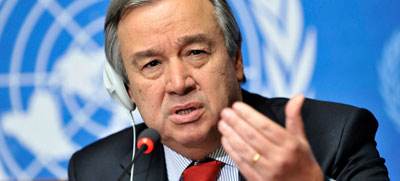Environment
Secretary-General’s Message to Summit Leaders of the UN Biodiversity Conference

We are losing our suicidal war against nature
by António Guterres
Our two-century-long experiment with burning fossil fuels, destroying forests, wilderness and oceans, and degrading the land, has caused a biosphere catastrophe.
Humanity’s reckless interference with nature will leave a permanent record – just as today’s scientists study the traces of previous extinctions.
We are well into the Anthropocene extinction. The rate of species loss is tens to hundreds of times higher than the average of the past 10 million years – and accelerating. Over a million species of plants, mammals, birds, reptiles, amphibians, fish and invertebrates are at risk – many within decades.
Damage to the complex web of life that sustains us has already impacted the lives and livelihoods of millions, contributing to hunger, sickness and unemployment.
Indigenous people and other vulnerable groups are among the worst affected.
Ecosystem collapse could cost almost three trillion US dollars annually by 2030. Its greatest impact will be on some of the poorest and most highly indebted countries.
I thank China for convening and hosting this meeting and for promoting the post-2020 Global Biodiversity Framework.
COP15 is our chance to call a ceasefire. Together with COP26 on climate, it should lay the foundations for a permanent peace agreement.
By 2030, we must reverse our trajectory and start to build the world we want.
Excellencies, Ladies and gentlemen,
An ambitious and effective post-2020 Global Biodiversity Framework, with clear targets and benchmarks, can put nature and people back on track.
This framework should work in synergy with the Paris Agreement on climate change, and other multilateral agreements on forests, desertification and oceans.
We need bold actions in five areas.
First, the post-2020 framework must support the legal right of all people, everywhere, to a healthy environment, including the rights of indigenous peoples who are stewards of biodiversity;
Second, it must support national policies and programmes that tackle the drivers of biodiversity loss, especially unsustainable consumption and production;
Third, it must work to transform national and global accounting systems, so they reflect the true cost of economic activities, including their impact on nature and our climate;
Fourth, delivering the post-2020 framework will require a package of support to developing countries, including significant financial resources and technology transfer;
And fifth, it must end perverse subsidies, including to agriculture, that make it profitable to attack nature and pollute our environment. These funds should be redirected into repairing the damage that has been done.
Action in these five areas will go far beyond biodiversity. It will contribute across the 2030 Agenda for Sustainable Development: to climate action, health, clean water and clean air, and ending poverty and hunger.
Excellencies, ladies and gentlemen,
Young people stand to lose most from the devastation of natural environments and the loss of species.
They are crying out for change. And they are mobilizing for a sustainable future for all.
They, and we, are counting on you.
I urge you to be bold and ambitious
For our future, and the future of all generations to come.
Thank you.
António Guterres, the ninth Secretary-General of the United Nations, took office on 1st January 2017.
Prior to his appointment as Secretary-General, Mr. Guterres served as United Nations High Commissioner for Refugees from June 2005 to December 2015, heading one of the world’s foremost humanitarian organizations during some of the most serious displacement crises in decades. The conflicts in Syria and Iraq, and the crises in South Sudan, the Central African Republic and Yemen, led to a huge rise in UNHCR’s activities as the number of people displaced by conflict and persecution rose from 38 million in 2005 to over 60 million in 2015.
Before joining UNHCR, Mr. Guterres spent more than 20 years in government and public service. He served as prime minister of Portugal from 1995 to 2002, during which time he was heavily involved in the international effort to resolve the crisis in East Timor.
https://www.un.org

